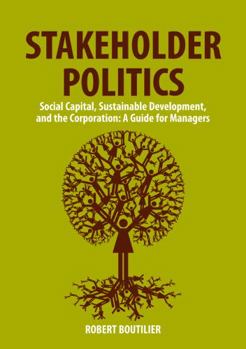Stakeholder Politics: Social Capital, Sustainable Development, and the Corporation
The war is over. The largest corporations in the world are now committed to sustainability. But, behind the public relations gloss, corporate executives and managers are perplexed. The majority of them have a genuine desire to work in an ethical and sustainable manner. Yet, when they engage with their stakeholders for that purpose, they unexpectedly encounter a world of hardball politics full of hostile activists, self-interested elites and unpredictable attacks. Unfortunately, corporate management is too often unskilled in this rough-and-tumble world. While managers rely on facts and rational analysis, their self-appointed critics have mastered the arts of political discourse, issue framing and media manipulation. At the same time, as corporations extend their global reach, their third-world stakeholder communities are beset with a variety of poverty-maintaining and sustainability-thwarting conditions. In many parts of the world, communities suffer from entrenched divisions, exclusion from power, unpredictable violence and economic dependency. In order to both reduce reputational risk and to contribute to sustainable development, companies need the equivalent of roadmaps of the socio-political terrain in their stakeholder networks.This book moves on to next challenge of giving companies what they need now: namely, how to guides addressing the twin problems of firstly maintaining political legitimacy (talking the talk), and, secondly, promoting sustainable development (walking the walk). They need to learn how to both play stakeholder politics and collaborate with stakeholders towards sustainability goals. Most companies have already encountered or anticipated the barriers that this book addresses, and managers will recognize the dilemmas described.Stakeholder Politics is the first book to offer a method for classifying and dealing with these socio-political problems.The book presents a typology of stakeholder networks that will help managers and community leaders identify and improve the social capital patterns in their own networks. Once they know what patterns they have, they can move their networks towards those that foster sustainable community development. The author describes vivid cases in which managers and community stakeholders have already used the approach successfully. At the same time, managers get handy tools for predicting and avoiding community-level socio-political risk around stakeholder issues: most notably, the Stakeholder 360 which has been successfully used in Canada and Australia with large groups of managers learning about stakeholder engagement.The book has been written for an audience of both managers and academics. Those working in developing countries with difficult stakeholder issues will find it indispensable.
Format:Hardcover
Language:English
ISBN:1906093156
ISBN13:9781906093150
Release Date:January 2009
Publisher:Routledge
Length:248 Pages
Weight:1.19 lbs.
Dimensions:0.6" x 6.1" x 9.2"
Customer Reviews
0 rating





